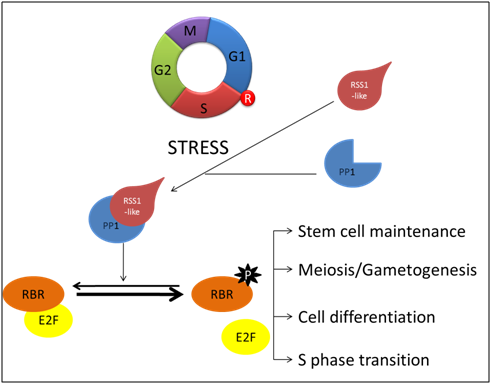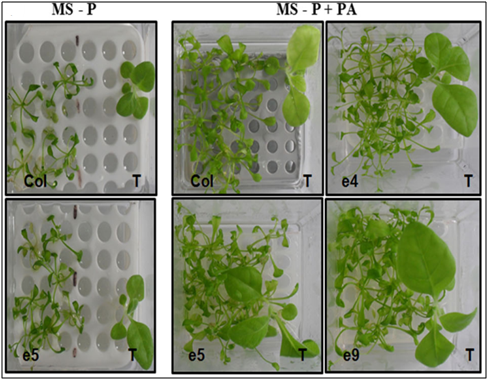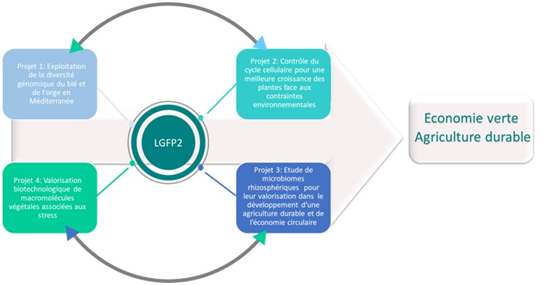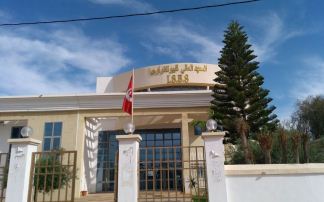Directeur : Pr. Moez Hanin
Présentation
Créée en 2017, l'Unité de Génomique Fonctionnelle et de Physiologie des Plantes ou UGFP2 se positionne pour mettre en place des projets de recherche innovants et stratégiques pour l’agriculture et le développement durable en Tunisie afin de faire face au changement climatique menaçant sérieusement la sécurité alimentaire. Les activités de recherche que nous proposons sont parfaitement alignées avec les domaines et thématiques de recherche prioritaires du pays à savoir la sécurité alimentaire, énergétique et hydrique.
Objectifs
Notre équipe œuvre ainsi à développer des approches intégrées basées à la fois sur des méthodes innovantes comme les outils “omiques”, la technologie digitale et la science des données pour accélérer nos recherches et améliorer les rendements des cultures céréalières (blé et orge) face à des contraintes environnementales.
Plus spécifiquement nous développons des projets visant à i) comprendre les mécanismes cellulaires, moléculaires et physiologiques de tolérance des plantes aux stress biotiques et abiotiques (sécheresse, salinité, carence minérale, etc) pour une meilleure adaptation des cultures céréalières aux changements environnementaux et climatiques et à ii) valoriser des macromolécules issues des plantes et de microbiomes rhizosphériques dans l’agriculture durable et l’économie verte.
Nos activités de recherche sont structurées au tour de quatre axes :
- Exploitation de la diversité génomique du blé et de l'orge en Méditerranée pour l’amélioration des cultures dans un contexte de changement climatique
- Contrôle du cycle cellulaire pour une meilleure croissance des plantes face aux contraintes environnementales
- Etude de microbiomes rhizosphériques pour leur valorisation dans le développement d’une agriculture durable et de l’économie circulaire
- Valorisation biotechnologique de macromolécules végétales associées aux stress

Les protéines phosphatases et leur rôle dans la signalisation cellulaire de la réponse aux stress

La surexpression de la phosphatase de blé TdPP1 favorise la plasticité des racines en modifiant l'interaction auxine-brassinostéroïdes

Performance de croissance des plants de tabac cultivés conjointement avec des lignées d’Arabidopsis sécrétant une phytase bactérienne dans un milieu MS déficient en Pi et contenant du phytate.
Les différents projets développés au sein de notre équipe, se déroulent en parfaite synergie comme le montre le schéma suivant :

Chercheurs
- Professeur Moez Hanin : moez.hanin@isbs.usf.tn
- Professeur Radhouan Kammoun : radhouan.kammoun@isbs.usf.tn
- Professeur Nabil Miled : nabil.miled@isbs.rnu.tn
- Professeur Yassine Ben Ali : yassine.benali@isbs.usf.tn
- Dr. Chantal Ebel : chantal.ebel@isbs.usf.tn Dr. Sofiane Ghorbel : sofiane.ghorbel@isbs.rnu.tn
- Dr. Samiha Mezghani : samiha.trabelsi@isbs.usf.tn
- Dr. Salem Baccouche : salembch@yahoo.fr
- Dr. Sihem Drira : sihem.Drira@isbs.usf.tn
- Dr. Hadhri Boutheina : bouteina.hadhri@isbs.usf.tn
- Dr. Saber Kouas : kouas_saber@yahoo.fr
- Dr. Bahia AMOURI : bahia.amouri@isbs.usf.tn
- Dr. Ahmed REKIK: Ahmed.rekik@isbs.usf.tn
- Dr. Khalil MSEDDI: mseddi36@gmail.com
Chercheurs post-doctoraux
- Rania Jmal : raniajmalabid86@gmail.com
- Safa Charfeddine : charfeddine_safa@yahoo.fr
- Imen Ghazala: imenghazala@gmail.com
Doctorants
- Naima Sayahi: doctorante
- Siwar Ghanmi: doctorante
- Wided Ellifa: doctorante
- Faten Amor: doctorante
Sélection de publications
2023
- Djemal R, Bradai M, Amor F, Hanin M, Ebel C. (2023). Wheat type one protein phosphatase promotes salt and osmotic stress tolerance in Arabidopsis via auxin-mediated remodelling of the root system. Plant Physiol Biochem. Aug;201: 107832. doi: 10.1016/j.plaphy.2023.107832.
- Ghorbel, M., Zaidi, I., Ebel, C. et al. The wheat Mitogen Activated Protein Kinase TMPK3 plays a positive role in salt and osmotic stress response. Acta Physiol Plant 45, 71 (2023). https://doi.org/10.1007/s11738-023-03548-1
- Ghanmi S, Smith MA, Zaidi I, Drira M, Graether SP, Hanin M. (2023). Isolation and molecular characterization of an FSK2-type dehydrin from Atriplex halimus. Phytochemistry. Sep; 213:113783. doi: 10.1016/j.phytochem.2023.113783.
2022
- Sayahi, N., Djemal, R., Ben Merdes, K. et al. (2022). Characterization of Siccibacter sp. Strain C2 a Novel Rhizobacterium that Enhances Tolerance of Barley to Salt Stress. Curr Microbiol 79, 239. https://doi.org/10.1007/s00284-022-02930-5
- Belgaroui N, El ifa W, Hanin M (2022) Phytic acid contributes to the phosphate-zinc signaling crosstalk in Arabidopsis, Plant Physiology and Biochemistry, 183, 1-8.
- Ghanmi S, Graether SP, Hanin M. (2022) The Halophyte Dehydrin Sequence Landscape. Biomolecules. 12(2):330. doi: 10.3390/biom12020330.
2021
- Mergby D, Hanin M, Saidi MN (2021) The durum wheat NAC transcription factor TtNAC2A enhances drought stress tolerance in Arabidopsis. Environmental and Experimental Botany. 186, 104439,
2020
- Choura M, Rebaï A, Hanin (2020). Proteome-wide analysis of protein disorder in Triticum aestivum and Hordeum vulgare. Comput Biol Chem. 2020 Feb;84:107138.
2019
- Choura M, Ebel C, Hanin M (2019) Genomic analysis of intrinsically disordered proteins in cereals: From mining to meaning. Gene. 714: 143984. doi: 10.1016/j.gene.2019.143984.
- Neji M, Kouas S, Gandour M, Aydi S, Abdelly C. (2019). Genetic variability of morpho-physiological response to phosphorus deficiency in Tunisian populations of Brachypodium hybridum. Plant Physiology and Biochemistry 143 : 246-256.
- Saadaoui I, Krichen F, Ben Salah B, Ben Mansour R, Miled N, Bougatef A, Mohamed Kossentini. (2019) Design, synthesis and biological evaluation of Schiff bases of 4-amino-1,2,4-triazole derivatives as potent angiotensin converting enzyme inhibitors and antioxidant activities. Journal of Molecular Structure, 1180, 344-354. doi.org/10.1016/j.molstruc.2018.12.008
2018
- Ghorbel M, Zaidi I Ebel C, Hanin M (2018) Differential regulation of the durum wheat MAPK Phosphatase 1 by calmodulin, bivalent cations and possibly Mitogen Activated Protein Kinase 3. Plant Physiol Biochem. 135: 242-252. doi: 10.1016/j.plaphy.2018
- Mahjoubi H, Tamari Y, Takeda S, Bouchabké-Coussa O, Hanin M, Herzog E, Schmit AC, Chabouté ME, Ebel C (2018) The wheat TdRL1 is the functional homolog of the rice RSS1 and promotes plant salt stress tolerance. Plant Cell Rep. 37:1625-1637. doi: 10.1007/s00299-018-2333-2.
- Ebel C, BenFeki A, Hanin M, Solano R, Chini A. (2018) Characterization of wheat (Triticum aestivum) TIFY family and role of Triticum Durum TdTIFY11a in salt stress tolerance. PLoS One. 2018 Jul 18;13(7):e0200566. doi: 10.1371/journal.pone.0200566.
- Bradai M, Mahjoubi H, Chini A, Chabouté ME, Hanin M, Ebel C (2018) Genome wide identification of wheat and Brachypodium type one protein phosphatases and functional characterization of durum wheat TdPP1a. PLOS ONE. 13(1): e0191272
- Belgaroui N, Lacombe B, Rouached H, Hanin M (2018). Phytase overexpression in Arabidopsis improves plant growth under osmotic stress and in combination with phosphate deficiency. Scientific Reports. 8(1):1137. doi: 10.1038/s41598-018-19493-w.
2017
- Ghorbel M, Cotelle V, Ebel C, Zaidi I, Ormancey M, Galaud JP, Hanin M (2017) Regulation of the wheat MAP kinase phosphatase 1 by 14-3-3 proteins. Plant Sci. 257: 37-47.
- Secco D, Bouain N, Rouached A, Prom-U-Thai C, Hanin M, Pandey AK, Rouached H (2017) Phosphate, phytate and phytases in plants: from fundamental knowledge gained in Arabidopsis to potential biotechnological applications in wheat. Crit. Rev. Biotech. 12: 1-13.
2016
- Hanin M, Ebel C, Ngom M, Laplaze L, Masmoudi K (2016) New insights on plant salt tolerance mechanisms and their potential use for breeding. Front. Plant Sci. 7: 1787.
- Belgaroui N, Berthomieu P, Rouached H, Hanin M (2016) The secretion of the bacterial phytase PHY-US417 by Arabidopsis roots reveals its potential for increasing phosphate acquisition and biomass production during co-growth. Plant Biotechnol. J. 14: 1914-1924.
- Zaidi I, Ebel C, Belgaroui N, Ghorbel M, Amara I, Hanin M (2016) The wheat MAP kinase phosphatase 1 alleviates salt stress and increases antioxidant activities in Arabidopsis. J. Plant Physiol. 193: 12-21.
2015
- Ebel C, Hanin M (2015) Maintenance of meristem activity under stress: is there an interplay of RSS1-like proteins with the RBR pathway? Plant Biol. (Stuttg). 18:167-170.
- Mahjoubi H, Ebel C, Hanin M (2015) Molecular and functional characterization of the durum wheat TdRL1, a member of the conserved Poaceae RSS1-like family that exhibits features of intrinsically disordered proteins and confers stress tolerance in yeast. Funct. Integr. Genomics. 15:717-728.
Projets Collaboratifs :
- Projet PHC Maghreb 23MAG09:
Approches intégrées exploitant les PGPR, les pHytohormones, et les haLOphytes dans la stimulation de la croissance et l’amélioration des cultures végétales sous contraintes Environnementales dans le bassin Méditerranéen (Acronym: PHLOEM), en collaboration avec
- ME Chabouté, Alexandre Berr; Institut de Biologie Moléculaire des Plantes du CNRS-Strasbourg, France:
- Mustapha Barakate; Laboratoire de Biotechnologies Microbiennes, Faculté des Sciences Semlalia- Université Cadi Ayyad-Marrakech
-Projets financés par la Communauté Européenne
1. Projet Twinning/Horizon Europe (Programme HORIZON-WIDERA-2021-ACCESS-03-01). “Strengthening Capacities & promoting Innovation in plantomics”; (Acronym: INPLANTOMICS). En collaboration avec
- Ghent University. Belgique
- University of Pavia. Italie
- HMGU Research Center, Munich. Allemagne
2.Projet PRIMA: "Utilization of local genetic diversity for studying barley adaptation to harsh environments and for pre-breeding" (Acronym: GENDIBAR). En collaboration avec
- A. Fricano & R. Battaglia “Research Centre of Genomics and Bioinformatics” du CREA (Council for Agricultural Research and Agricultural Economy). Italie
- Autres Pays Méditerranéens (Turquie, Egypte, Algérie et Espagne)
3.Projet PRIMA: BenefitMed. En collaboration avec
- Alma Balestrazzi (Université Pavie, Italie)
- Autres Pays Méditerranéens & Européens (Maroc, Egypte, Algérie, Allemagne, Grèce et Espagne)
4. Projets financés par la “Royal Society” en Grande Bretagne
Deux projets ont été acceptés :
- Improvement of cereal crop phosphate nutrition through beneficial soil microbes.
En collaboration avec Jeongmin Choi & Uta Paszkowski au Crop Science Centre (Department of Plant Sciences; University of Cambridge)
- Establish an open and low-cost phenotyping platform to enable bilateral seed research on salinity and drought tolerance in wheat
En collaboration avec Ji Zhou du NIAB (National Institute of Agricultural Botany; Cambridge)
FUNCTIONAL GENOMICS AND PLANT PHYSIOLOGY RESEARCH UNIT
Presentation
Created in 2017, the Functional Genomics and Plant Physiology Unit or UGFP2 is positioned to implement innovative and strategic research projects for agriculture and sustainable development in Tunisia in order to address climate change seriously threatening food security. The research activities we propose are perfectly aligned with the country's priority research areas and themes, namely food, energy and water security.
Objectives
The aim of our team is to develop integrated approaches based on innovative methods such as "omics" tools, digital technology and data science to accelerate our research and improve cereal crop yields (wheat and barley) in the face of environmental constraints.
More specifically, we are developing projects aimed at i) understanding the cellular, molecular and physiological mechanisms of plant tolerance to biotic and abiotic stresses (drought, salinity, mineral deficiency, etc.) for better adaptation of cereal crops to environmental and climatic changes, and ii) valorizing macromolecules derived from plants and rhizospheric microbiomes in sustainable agriculture and the green economy.
Keywords
Sustainable agriculture, genomics, microbiome, stress tolerance
Our research activities are structured around four axes:
- Exploiting genomic diversity in Mediterranean wheat and barley for crop improvement in a context of climate change
- Cell cycle control for improved plant growth in the face of environmental constraints
- Study of rhizospheric microbiomes for their valorization in the development of sustainable agriculture and the circular economy
- Biotechnological valorization of stress-related plant macromolecules
Liens utiles/Useful links













